Customer Logins
Obtain the data you need to make the most informed decisions by accessing our extensive portfolio of information, analytics, and expertise. Sign in to the product or service center of your choice.
Customer Logins
ECONOMICS COMMENTARY
Oct 06, 2015
Recession set to deepen in third quarter as Brazil PMI slumps
Brazil saw stagflationary pressures intensify in September, adding to the dilemma facing the central bank. PMI data showed that the country to have remained in a severe slump with its recession deepening while price pressures rose to a survey record high.
Deepening recession
At 42.7 in September, the Markit Composite PMI fell to the third-lowest seen since the height of the global financial crisis in March 2009. The average PMI reading for the third quarter of 42.8 was up only marginally from the 42.7 average seen in the second quarter.
The survey data therefore point to the economy contracting in the third quarter at a similar rate to the severe 1.9% decline seen in the second quarter.
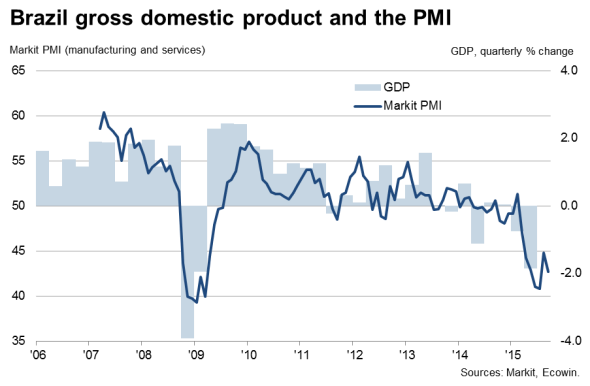
With companies' orders books collapsing in September at the fastest rate since March 2009, the downturn looks set to persist and even intensify in the fourth quarter.
As such, the data point to a deepening of the recession and indicate a strong likelihood of the economy contracting by over 3% in 2015, more than double the IMF's current estimate of a 1.5% decline.
The real is down 35% against the US dollar so far this year One benefit of the depreciation has been the support to Brazil's exporters, with improved international competitiveness goods exports to stabilise in September.
Exchange rate
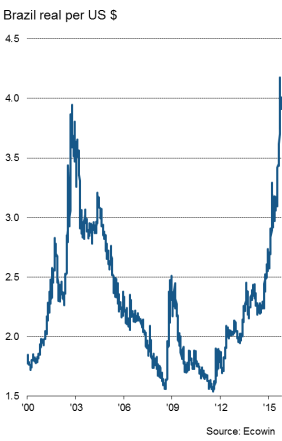
However, a downturn that had originally been led by the manufacturing and export sectors amid dwindling global demand for basic goods and commodities has been exacerbated in recent months by a severe slump in the more domestically-focused services economy.
The recent PMI data are signalling a service sector downturn of similar scale to that seen during the financial crisis, with a marked acceleration in the rate of decline of new business seen in September.
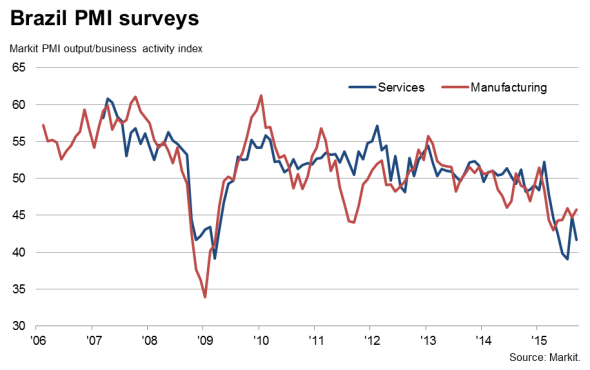
Record price rise
The problem Brazil faces is the rise of inflation following the real's fall, which is hitting the domestic economy. The central bank has had to hike interest rates to 14.25% in an attempt to control inflation, which rose to 9.9% in August. But with the PMI survey index of average prices charged for goods and services hitting a record high in September as firms pass higher costs on to customers, the return of double-digit inflation looks inevitable.
Policy makers are therefore stuck between the need to revive the economy with stimulus measures and a need to control inflation with tighter policy.
Prices
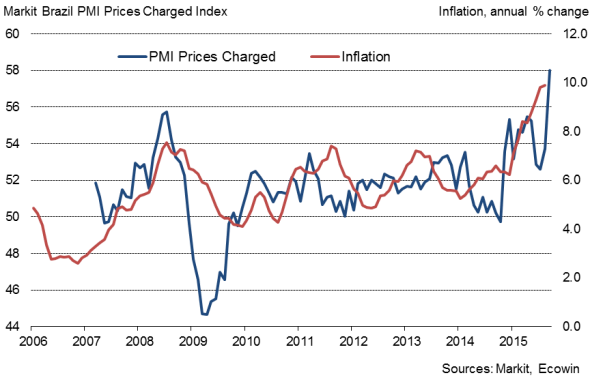
Interest rate
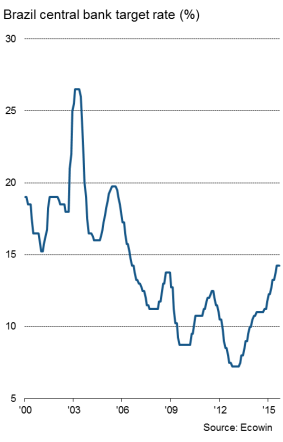
Chris Williamson | Chief Business Economist, IHS Markit
Tel: +44 20 7260 2329
chris.williamson@ihsmarkit.com
{"items" : [
{"name":"share","enabled":true,"desc":"<strong>Share</strong>","mobdesc":"Share","options":[ {"name":"facebook","url":"https://www.facebook.com/sharer.php?u=http%3a%2f%2fwww.spglobal.com%2fmarketintelligence%2fen%2fmi%2fresearch-analysis%2f06102015-Economics-Recession-set-to-deepen-in-third-quarter-as-Brazil-PMI-slumps.html","enabled":true},{"name":"twitter","url":"https://twitter.com/intent/tweet?url=http%3a%2f%2fwww.spglobal.com%2fmarketintelligence%2fen%2fmi%2fresearch-analysis%2f06102015-Economics-Recession-set-to-deepen-in-third-quarter-as-Brazil-PMI-slumps.html&text=Recession+set+to+deepen+in+third+quarter+as+Brazil+PMI+slumps","enabled":true},{"name":"linkedin","url":"https://www.linkedin.com/sharing/share-offsite/?url=http%3a%2f%2fwww.spglobal.com%2fmarketintelligence%2fen%2fmi%2fresearch-analysis%2f06102015-Economics-Recession-set-to-deepen-in-third-quarter-as-Brazil-PMI-slumps.html","enabled":true},{"name":"email","url":"?subject=Recession set to deepen in third quarter as Brazil PMI slumps&body=http%3a%2f%2fwww.spglobal.com%2fmarketintelligence%2fen%2fmi%2fresearch-analysis%2f06102015-Economics-Recession-set-to-deepen-in-third-quarter-as-Brazil-PMI-slumps.html","enabled":true},{"name":"whatsapp","url":"https://api.whatsapp.com/send?text=Recession+set+to+deepen+in+third+quarter+as+Brazil+PMI+slumps http%3a%2f%2fwww.spglobal.com%2fmarketintelligence%2fen%2fmi%2fresearch-analysis%2f06102015-Economics-Recession-set-to-deepen-in-third-quarter-as-Brazil-PMI-slumps.html","enabled":true}]}, {"name":"rtt","enabled":true,"mobdesc":"Top"}
]}



